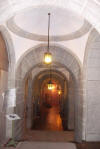







Holiday in Devon, Friday 28th March - Friday 4th April 2014
Drum Cottage, Liverton, Near Newton Abbot, Devon.
Home Devon Day 1 Day 2 Day 3 Day 5 Day 6 Day 7 Day 8
Day 4 - Monday 31st March 2014
Today we drove to visit Castle Drogo. This National Trust property is the last castle to be built in England. The architect was Sir Edwin Lutyens; building began in 1910, was delayed by WW1 as many of the masons, labourers, etc were conscripted or volunteered for the services. The building was completed in 1930, although the owner, businessman Julius Drewe, was able to live in the house by 1925. It was built from local granite with reinforced concrete foundations and roof. The owner wanted a flat roof so his guests could see the country views around from the roof. The waterproofing material used was asphalt, but this did not prove adequate and leakage was a constant problem. NT have started a 5 year programme to replace the roof with a proven rubber membrane system used in Germany for many years.
Photos: corridors in castle, a desk and collections in the estate office, a reproduction antique chair, children's toys, and a mechanical football game.
Photos of the tower, The castle covered in sheeting, the repairs to the roof, the croquet lawn, the children's cottage and a play house.
After lunch at Castle Drogo we continued on to visit another NT property, Finch Foundry. This is an industrial site in which William Finch set up an edge tool forge in the village of Sticklepath. The building had been a woollen weaving mill earlier and had an industrial history going back much earlier. The forge was water powered as were many other businesses in Sticklepath. The forge continued in business, owned by the same Finch family until 1960. After nearly being demolished, the business was resurrected by a former employee and run by a voluntary Trust until a bequest made it possible for the National Trust to take on the forge.
The mill is powered by 3 water wheels (all now overshot to maximise power efficiency). The Photographs show some of the products made - edge tools mainly. The final photograph shows an unusual double link chain lifting gear.